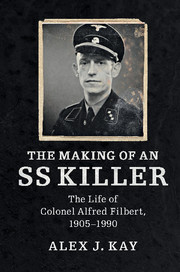Book contents
- Frontmatter
- Contents
- List of illustrations
- List of tables
- Acknowledgements
- List of abbreviations
- Glossary
- Introduction
- 1 ‘I went to school with quite a number of Jewish co-religionists and never knew hatred for Jews’: childhood, youth and early adulthood, 1905–1932
- 2 ‘In terms of his character he is irreproachable in every respect’: Nazi Party membership and career in the SS Security Service, 1932–1939
- 3 ‘Pity that the scoundrel didn't perish’: brother's imprisonment and career stagnation, 1939–1941
- 4 ‘So, we've finished off the first Jews’: SS-Einsatzkommando 9 and deployment in the East, June–July 1941
- 5 ‘In Vileyka, the Jews had to be liquidated in their entirety’: genocide of Belarusian Jewry, July–October 1941
- 6 ‘Was it thinkable that I, a jurist and a soldier, would do such a thing?’: suspension from the Reich Security Main Office and reinstatement until the war's end, 1941–1945
- 7 ‘My son, who has not yet returned home from the war’: post-war submergence and reintegration into West German society, 1945–1959
- 8 ‘A trial of this magnitude has never previously taken place before a German court’: arrest and trial, February 1959–June 1962
- 9 ‘A limited, lower middle class, status-and-promotion seeking philistine’: imprisonment and early release, 1962–1975
- 10 ‘A chess game of egos’: Wundkanal and aftermath, 1975–1990
- Concluding thoughts
- Notes
- Sources and literature cited
- Index
10 - ‘A chess game of egos’: Wundkanal and aftermath, 1975–1990
Published online by Cambridge University Press: 05 April 2016
- Frontmatter
- Contents
- List of illustrations
- List of tables
- Acknowledgements
- List of abbreviations
- Glossary
- Introduction
- 1 ‘I went to school with quite a number of Jewish co-religionists and never knew hatred for Jews’: childhood, youth and early adulthood, 1905–1932
- 2 ‘In terms of his character he is irreproachable in every respect’: Nazi Party membership and career in the SS Security Service, 1932–1939
- 3 ‘Pity that the scoundrel didn't perish’: brother's imprisonment and career stagnation, 1939–1941
- 4 ‘So, we've finished off the first Jews’: SS-Einsatzkommando 9 and deployment in the East, June–July 1941
- 5 ‘In Vileyka, the Jews had to be liquidated in their entirety’: genocide of Belarusian Jewry, July–October 1941
- 6 ‘Was it thinkable that I, a jurist and a soldier, would do such a thing?’: suspension from the Reich Security Main Office and reinstatement until the war's end, 1941–1945
- 7 ‘My son, who has not yet returned home from the war’: post-war submergence and reintegration into West German society, 1945–1959
- 8 ‘A trial of this magnitude has never previously taken place before a German court’: arrest and trial, February 1959–June 1962
- 9 ‘A limited, lower middle class, status-and-promotion seeking philistine’: imprisonment and early release, 1962–1975
- 10 ‘A chess game of egos’: Wundkanal and aftermath, 1975–1990
- Concluding thoughts
- Notes
- Sources and literature cited
- Index
Summary
Following his release from prison for health reasons in June 1975, Filbert lived for another fifteen years. He returned to 49 Bamberger Straße in West Berlin, where he would remain until his death in 1990. In 1983, Filbert's pre-1945 biography was the subject of a request for information submitted by the District Administration for State Security in Rostock in East Germany to the Main Department IX/11 within the Ministry of State Security, commonly known as the Stasi, in East Berlin. The request was made in the context of the ‘processing of operative material’ (Bearbeitung eines operativen Materials). The backdrop to the request appears to have been the fact that the District Administration for State Security in Rostock had become aware ‘that in the FRG a film is being made with the professional advice of Fillbert [sic]’ (daß in der BRD ein Film unter Fachberatung des Fillbert gefertigt wird). In fact, Filbert was providing much more than specialist advice: he was acting in the lead role.
The former SD officer, RSHA member and Italy specialist Karl Haß – whose wife had officially declared him dead in 1953 – had played small supporting roles in various feature films during the 1960s, including a bit part in Luchino Visconti's La caduta degli dei (‘The Damned’, 1969), generally as a member of the SA or the SS. The only time a convicted Nazi mass murderer has played a mass murderer in a feature film, however, was in 1984 in the film Wundkanal – Hinrichtung für vier Stimmen (‘Gun Wound – Execution for Four Voices’). According to the film's closing credits, it stars ‘Alfred F.’ in the lead role of ‘Dr S.’. This was Alfred Filbert, wearing a toupee and, intermittently, a false moustache. The character's name was no coincidence. Filbert had once before been known under the name ‘Dr S.’: Dr Selbert, the name he had used for the first six years after the war. In Wundkanal, Filbert was in many ways playing himself. The director and producer was Thomas Harlan, son of Veit Harlan, director of the notorious Nazi anti-Semitic propaganda film Jud Süß (‘The Jew Süss’). Harlan junior devoted his life, initially in the Polish archives, later in films and novels, to tracking down and uncovering mid-level Nazi perpetrators and their post-war careers; men like his father, men like Filbert.
- Type
- Chapter
- Information
- The Making of an SS KillerThe Life of Colonel Alfred Filbert, 1905–1990, pp. 110 - 121Publisher: Cambridge University PressPrint publication year: 2016



